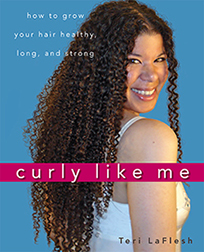
Available now!
Curly Like Me, the off-the-grid, do-it yourself owner's manual for tightly curly hair, is ready for ordering. Grab your copy today!

Every purchase made from
this site (through Amazon)
helps support it — and it
doesn't cost you anything
extra.
|
|
In the ingredient descriptions: Good means that I like to see this in a product's list of ingredients. Okay means this product appears safe for a curly person like me to use. Caution means that this ingredient may not be good in some hair care products, or for some people. Avoid means this ingredient may hurt your hair. If you see this ingredient in a hair product, it's best to put it down and walk away.
|
|
| |
Parabens
Caution
A group of food grade preservatives such as butylparaben, proplyparaben, methylparaben, and ethylparaben. Research is inconclusive about whether these are harmful. However, it's agreed that it is more harmful to use products with no preservatives in them than products with these in them. For more information, check out: Parabens.
The Parabens are widely used to preserve cosmetics because they cause less irritation than other preservatives. Many of the studies on Parabens found them to possibly cause breast cancer, but many of these tests were on animals, and were given orally or through injections (which is not how humans usually come in contact with them). To keep things in perspective, many plants produce similar chemicals in our bodies (estrogen in high levels may cause breast cancer in some women) that are believed to increase cancer risk such as soy.
Though traces of parabens were found in breast tumor tissues, there haven't been studies to find out if the same levels of parabens are present in healthy breast tissues. No one is yet certain if the presence of parabens in cosmetics is the problem (since they are also used in foods, the parabens found in human tissue may be from parabens that were eaten instead).
The European trade association has said that the four main parabens used in cosmetics in Europe have been studied and found safe. [Begoun (Cosmetics) pgs 1132-1133, Winter 7th ed., pgs 392-393].
See also:
Preservative
Source(s):
Begoun Winter
|
|
References:
Applewhite, Thomas H., ed. Proceedings of the World Conference on Lauric Oils: Sources, Processing, and Applications
AOCS Publishing, 1994.
Barel, André O., Marc Paye, and Howard I. Maibach., eds. Handbook of Cosmetic Science and Technology, Second Edition
Marcel Dekker, Inc., 2001.
Begoun, Paula. Don’t Go Shopping for Hair-Care Products Without Me. 3rd Edition.
Renton: Beginning Press, 2005.
Begoun, Paula. The Beauty Bible.
Renton: Beginning Press, 2002.
Begoun, Paula. Don’t Go to the Cosmetics Counter Without Me.
Renton: Beginning Press, 2003.
Bellum, Sarah, ed. The Beauty Brains: Real Scientists Answer Your Beauty Questions
New York: Brains Publishing, 2008.
Gottschalk, Tari E. and McEwen, Gerald N, Jr. PhD, eds. International Cosmetic Ingredient Dictionary and Handbook, Tenth Edition 2004, Volumes 1-4.
Washington D. C.: The Cosmetic, Toiletry, and Fragance Association, 2004.
Halal, John Hair Structure and Chemistry Simplified, Fifth Edition
Albany: Milady, 2002.
Hunting, Anthony L.L. Encyclopedia of Conditioning Rinse Ingredients.
Cranford, NJ: Micelle Press, Inc., 1987.
Hunting, Anthony L.L. Encyclopedia of Shampoo Ingredients.
Cranford, NJ: Micelle Press, Inc., 1983.
Johnson, Dale H. (Ed.). Hair and Hair Care, Cosmetic Science and Technology Series. Vol. 17.
New York: Marcel Dekker, 1997. Print.
Nnanna, Ifendu A. and Jiding Xia., eds. Protein-Based Surfactants: Synthesis: Physicochemical Properties, and Applications (Surfactant Science)
Madison Heights: CRC, 2001.
Quadflieg, Jutta Maria. Fundamental properties of Afro-American hair as related to their straightening/relaxing behaviour.
Diss. U of Rheinisch-Westfälischen Technischen Hochschule Aachen, 2003.
Schueller, Randy and Perry Romanowski, eds. Conditioning Agents for Hair and Skin.
New York: Marcel Dekker, Inc., 1999.
Winter, Ruth M.S. A Consumer's Dictionary of Cosmetic Ingredients: Complete Information About the Harmful and Desirable Ingredients Found in Cosmetics and Cosmeceuticals
New York: Three Rivers Press, 2005.
Zviak, Charles., ed. The Science of Hair Care (Dermatology)
New York: Marcel Dekker, Inc., 1986.
|
|